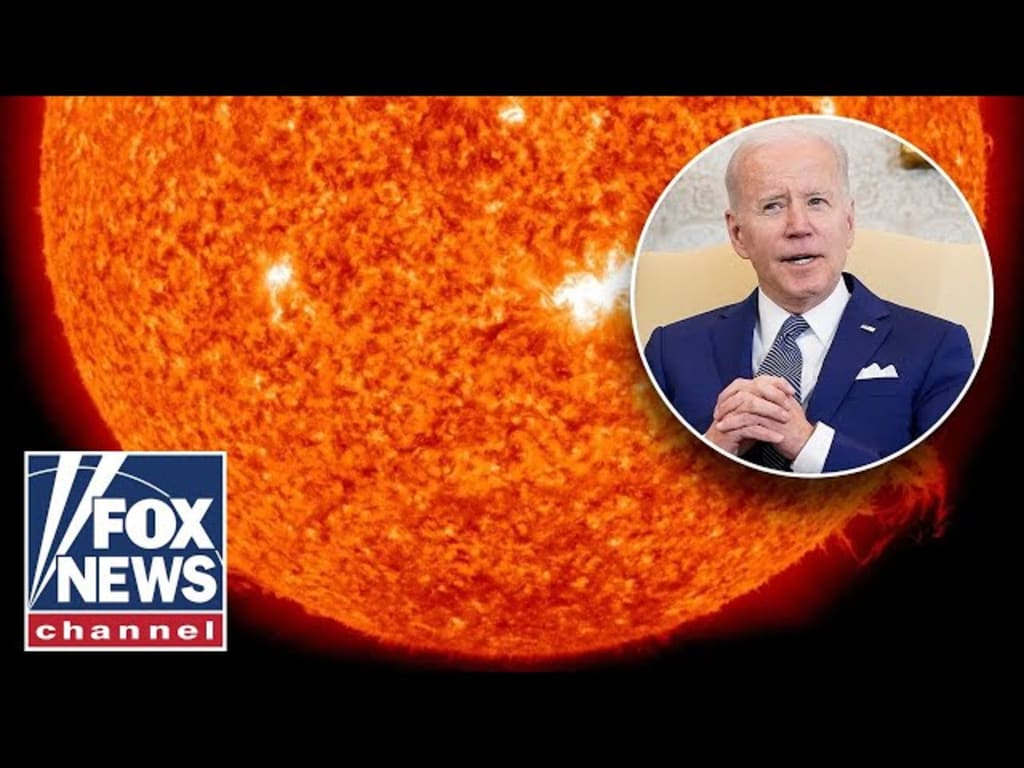Content warning
This story may contain sensitive material or discuss topics that some readers may find distressing. Reader discretion is advised. The views and opinions expressed in this story are those of the author and do not necessarily reflect the official policy or position of Vocal.
Biden Administration Considers Sunlight Blocking to Combat Global Warming, Raising Concerns
In a surprising turn of events, the Biden administration has hinted at the possibility of blocking sunlight as part of its fight against global warming.

Introduction:
In a surprising turn of events, the Biden administration has hinted at the possibility of blocking sunlight as part of its fight against global warming. While this concept may seem amusing when portrayed on television, recent statements from the White House spokesman indicate that solar radiation modification (SRM) is being seriously considered. The administration believes that researching and understanding the potential risks and benefits of SRM could inform climate policy decisions and complement efforts to reduce greenhouse gas emissions. However, critics, including our guest Mark Morano, warn that this approach could lead to government control over the weather. Today, we delve deeper into this issue.
The White House's Stance on Solar Radiation Modification:
The White House spokesman has acknowledged that researching solar radiation modification is part of the administration's climate policy agenda. The goal is to gain a better understanding of its potential implications and how it could contribute to mitigating global warming. By examining SRM as a complementary approach alongside efforts to reduce greenhouse gas emissions, the administration aims to make informed decisions about climate policy.
Concerns over Government Control:
Mark Morano, the publisher of ClimateDepot.com and our guest, expresses reservations about the potential ramifications of the Biden administration's interest in blocking sunlight. He suggests that this could be a covert way for the government to gain control over weather patterns. While the concept of blocking the sun may seem far-fetched, Morano argues that there might be more to this proposal than meets the eye.
Delving into the Reality:
According to Morano, the Biden administration's consideration of sunlight blocking is not as fantastical as it might initially appear. While blocking the sun entirely may not be feasible, the use of various techniques, such as injecting particles into the atmosphere or deploying large-scale reflective surfaces, could potentially reduce the amount of sunlight reaching the Earth's surface. These approaches, collectively known as solar radiation modification, have garnered attention in the scientific community as a potential means of mitigating global warming.
Proponents argue that by reducing the amount of sunlight reaching the Earth, it may be possible to offset some of the warming caused by greenhouse gas emissions. This could buy valuable time to implement long-term strategies to reduce emissions and transition to renewable energy sources. However, critics raise concerns about the unintended consequences of such interventions.
The Need for Caution and Thorough Research:
As discussions around solar radiation modification gain traction, it is crucial to approach this topic with caution. While the concept may hold promise in theory, the potential consequences, unintended side effects, and ethical concerns must be thoroughly examined before any implementation. Climate scientists and experts in related fields will play a pivotal role in assessing the feasibility, risks, and potential benefits of SRM.
One major concern is the unpredictable nature of climate systems. Altering the amount of sunlight reaching the Earth could have far-reaching effects on weather patterns, precipitation levels, and ecosystem dynamics. Without a comprehensive understanding of these complex interactions, implementing large-scale SRM projects could lead to unintended and potentially harmful consequences. Therefore, careful and extensive research is needed to evaluate the risks and benefits accurately.
Balancing Climate Policy:
The Biden administration's exploration of solar radiation modification highlights the complexities of addressing global warming. It underscores the need for a multifaceted approach that combines efforts to reduce greenhouse gas emissions with innovative strategies like SRM. However, this delicate balance requires extensive research, public engagement, and collaboration among scientists, policymakers, and stakeholders to ensure responsible decision-making.
In addition to the technical and scientific considerations, the ethical and governance aspects of SRM should also be thoroughly evaluated. Who would have the authority to make decisions about sunlight blocking? How would the potential risks and benefits be assessed and managed? These questions necessitate careful deliberation to avoid any misuse of power and to ensure transparency and accountability in decision-making processes.
Conclusion:
While the idea of blocking sunlight as a means to combat global warming may seem like a plot from a science fiction movie, it is gaining attention in the real world. The Biden administration's exploration of solar radiation modification reflects a commitment to exploring all available options to address climate change. However, it is essential to approach this concept with caution, considering the potential risks and implications associated with such drastic interventions. As the debate surrounding SRM continues, it is crucial to foster informed discussions, prioritize thorough research, and maintain transparency to navigate this complex issue and develop effective climate policies. The path to a sustainable future requires careful consideration of various approaches while ensuring the protection of our planet and its ecosystems.
About the Creator
Enjoyed the story? Support the Creator.
Subscribe for free to receive all their stories in your feed. You could also pledge your support or give them a one-off tip, letting them know you appreciate their work.





Comments
There are no comments for this story
Be the first to respond and start the conversation.